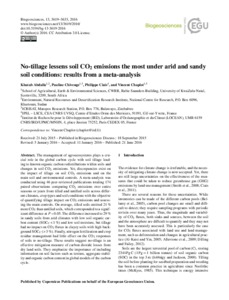No-tillage lessens soil CO2 emissions the most under arid and sandy soil conditions: results from a meta-analysis
Abstract
The management of agroecosystems plays a crucial role in the global carbon cycle with soil tillage leading to known organic carbon redistributions within soils and changes in soil CO2 emissions. Yet, discrepancies exist on the impact of tillage on soil CO2 emissions and on the main soil and environmental controls. A meta-analysis was conducted using 46 peer-reviewed publications totaling 174 paired observations comparing CO2 emissions over entire seasons or years from tilled and untilled soils across different climates, crop types and soil conditions with the objective of quantifying tillage impact on CO2 emissions and assessing the main controls. On average, tilled soils emitted 21% more CO2 than untilled soils, which corresponded to a significant difference at P 3 %). Finally, nitrogen fertilization and crop residue management had little effect on the CO2 responses of soils to no-tillage. These results suggest no-tillage is an effective mitigation measure of carbon dioxide losses from dry land soils. They emphasize the importance of including information on soil factors such as texture, aggregate stability and organic carbon content in global models of the carbon cycle

